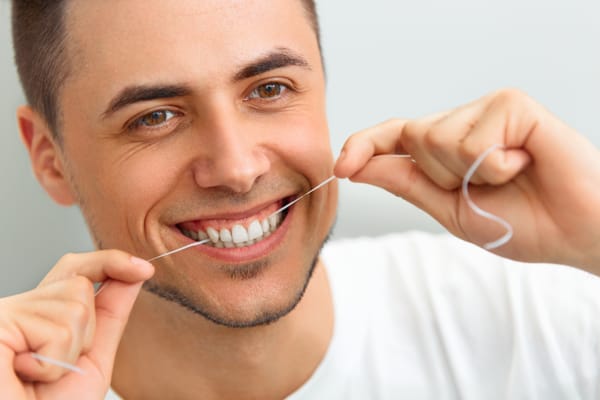
Welcome to our blog post all about flossing! It’s no secret that good oral hygiene practices are essential to maintaining a healthy and happy smile. Brushing your teeth twice a day is a given, but what about flossing? Why should you floss every day like every dentist recommends?
Let’s take a closer look at the arguments for and against flossing, and explore some alternative options.
What Is Flossing?
First, let’s talk about what flossing is and why it’s important. Flossing involves using a thin, string-like material to clean between your teeth and remove plaque and food particles that your toothbrush can’t reach. Traditional flossing uses the bare string, wrapped around your fingers for leverage. But modern flossing can include threaded flossers or even single-use flossing picks that make the job much easier.
The benefits of flossing are numerous, including preventing gum disease, reducing the risk of cavities, and maintaining fresh breath.
If you think about your mouth as a number of surfaces (top, front, back, left side, right side), your toothbrush is completely missing two complete surfaces on the sides. Would you consider any part of your home “clean” if you just skipped cleaning 40% of the areas? Of course not!
Bacteria doesn’t care how cramped its home is – as long as it’s there and receiving sources of energy from sugars and food in your mouth, the sides of your teeth are a fine place for it to thrive. Flossing is the only way to get those areas clean.
Do You Really Need to Floss Every Day?
Dental professionals recommend flossing at least once a day, typically before brushing your teeth. And we constantly hear the question “why should I floss every day, is it really that important?” The answer is a simple and emphatic “Yes!”
Flossing every day helps to remove plaque and food debris from between your teeth that your toothbrush can’t reach. This is important because if left unremoved, plaque can harden into tartar, which can only be removed by a dental professional.
Furthermore, it helps to prevent gum disease. Gum disease is a serious oral health condition that can lead to tooth loss if left untreated. Flossing helps to remove plaque and bacteria from between your teeth and along your gumline, reducing your risk of developing gum disease.
Finally, daily flossing can help to reduce your risk of developing cavities. When you eat, bacteria in your mouth feed on the sugars in your food and produce acid. This acid can erode your tooth enamel and lead to cavities. Flossing helps to remove food particles and plaque from between your teeth, reducing the amount of acid that is produced and ultimately reducing your risk of developing cavities.
Why Do Some Choose Not to Floss Daily?
Now, let’s address some of the arguments against flossing every day. One common argument is that flossing is time-consuming and uncomfortable. While it’s true that flossing can be uncomfortable or even painful at first, it’s important to remember that the discomfort will likely subside as you continue to floss regularly.
As for the time commitment, flossing only takes a few minutes out of your day, and the benefits are well worth the investment of time. In fact, the time spent flossing added up throughout your whole life is likely to be a lot less than the time spent suffering the effects of skipping this essential step. Between additional visits to the dentist, tooth pain and potentially dentures later in life, not flossing may be “penny wise and pound foolish” when it comes to spending your time.
Another argument against flossing every day is that it can cause bleeding or gum irritation. While it’s true that some individuals may experience bleeding or gum irritation when they first start flossing, this is typically a sign that your gums are inflamed or irritated from the buildup of bacteria and plaque. Regular flossing can actually help to reduce gum inflammation and bleeding over time.
Flossing Alternatives to Make Daily Flossing Easier
Let’s talk about some alternative options for those who struggle with traditional flossing. One alternative to traditional flossing is interdental brushes. Interdental brushes are small, cone-shaped brushes that can be used to clean between your teeth. They’re especially useful for individuals who have larger gaps between their teeth or who wear braces or other orthodontic appliances.
Another alternative to traditional flossing is water flossers. Water flossers use a stream of water to clean between your teeth and along your gumline. They’re especially useful for individuals with braces, implants, or other dental work that can make traditional flossing difficult.
While these alternatives can be useful for some individuals, it’s important to remember that traditional flossing is still the gold standard for maintaining good oral hygiene. Of course, the best kind of flossing for you is the one that you’ll do regularly. Even a quick, half-hearted attempt at flossing is better than not doing it at all!
Contact Walbridge Dental
Thinking about improving your smile with veneers? From routine cleaning and exams to advanced restorative treatments to oral cancer detection, the professionals at Walbridge Dental provide complete family dental care to families in the Millbury community. Contact us online to set up an appointment now or call us at 419-836-1033.
Connect on Social Media!
